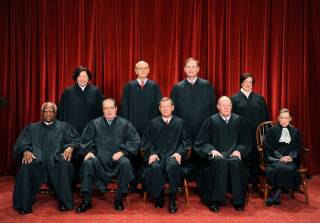Schwarzenegger v. EMA: Oral Argument FAQ for Gamers
By SuicidalSnowman 11 Comments
Schwarzenegger v. Entermtainment Merchants Association is the name of the case before the Supreme Court concerning California's law requiring additional labeling of "violent, deviant" games and criminal penalties for stores that allow minors to purchase them. First of all, I urge everyone to read the transcript of the oral argument. It is compelling and a great look into how America works. (Scribd version here.)
What is going on?
First of all, understand what oral argument is. When a case is appealed up to the Supreme Court, each side submits a written brief that makes their legal arguments, supported with authority in the form of case law, statutes, and possibly scientific studies. The Court considers these, and schedules oral arguments. Oral arguments involve each side presenting their case through one lawyer. Although there is time for the lawyer to make a presentation, in practice most of the time is simply answering the Justices' questions. The oral argument is designed to be an "intellectual debate" about the underlying legal issues. This is not a chance to try the case and prove facts, at this level the questions are all important legal issues.
Who is involved?
This case has Schwarzenegger's name on it, but of course he is not sitting in court arguing. As Governor, he supports laws for the state. Mr. Morazzini is actually arguing the case. He works in the Attorney General's office, and therefore, is required to argue on behalf of the Governor. On the other side, the Entertainment Merchants Association is an industry group for retailers of things such as movies and, obviously, video games. Theoretically, one single store that sells games could challenge this law, but an industry group is better able to pool resources and makes a larger political statement. None of this matters to the Supreme Court. The EMA hired Mr. Smith, a Washington, D.C. lawyer whose firm specializes in Supreme Court litigation. This is very common.What are they arguing?
California is arguing that this law gives parents increased authority over their kids and supports the State's important interest in protecting children. The EMA is arguing that this amounts to an invalid restriction of speech.What did the Justices ask California?
How do we define "deviant" violence?
They were very, very concerned with how the law will categorize "deviant" violence in games. Mr. Smith's answer was that it would be a "jury question." This means that it is a question of fact, and is determined by the jury to a "reasonable community" standard. Having a jury decide questions of fact to a reasonable standard is not uncommon. The Justices, particularly Scalia, were very concerned with the vagueness of the definition of deviance. Scalia contended that a manufacturer would never know what might be found to meet this standard. This can create a "chilling effect", that is people would simply not speak at all to avoid any trouble with the law. First Amendment jurisprudence is incredibly wary of chilling effects. At one point Mr. Morazzini suggested a state board for reviewing games, to which all the Justices reacted strongly. Scalia joked about naming them "California Censorship Boards."How do we define "minors?"
The Justices were more concerned with making broad determinations that a game which is too violent for a 5 year old is also too violent for an 18 year old. Mr. Morazzini compared it to pornography restrictions, which is a fair and valid comparison. The Justice's seemed satisfied in this area.How is this different from censorship?
The Justices were also concerned with how this law was different from censorship. Mr. Morazzini attempted to frame it in the light of protecting children, but the Justice's pressed him hard. He conceded that it was a restriction on speech, but offered justification on grounds of the importance of protecting children. Unfortunately, the Justice's were concerned about a "less restrictive means." Whenever free speech is abridged, the Court always wants to make sure the government is using the absolute minimal restriction necessary. In this case, privacy controls and "V-Chips" were discussed. Mr. Morazzini cited the ease with which a child can defeat these.What did the Justices ask the EMA?
Why can we restrict pornography and cigarettes from minors, but not video games?
The Court expressed concern with carving out a special protection for video games on the basis of violence, over other media on the basis of sexuality. Mr. Smith answered that it was due to our long standing tradition of restricting sex more than violence. He pointed out that we already prevent minors from buying sexually explicit movies, but allow them to see violent movies. He differentiated games from cigarettes on the ground that cigarettes are not speech. Although he got a few snippy responses from Justice Breyer, this is a sound legal argument.This lead to questioning about other restrictions. The FCC already restricts television programing based on the hour of the day, in an attempt to keep certain violence from children. Mr. Smith's response was that while constitutionally valid, it was a poor response to an impossible problem. He pointed out that this still comes down to parent control, and noted that California's law is much more severe.
Are video games constitutionally protected from all speech restrictions?
Mr. Smith suggested that the EMA's position was that video games deserved the same protection as all other forms of media. The Justices pressed him on this, asking several times if perhaps a statute could be written that would have a similar effect but pass constitutional muster. Mr. Smith repeatedly said no. The Court seemed generally displeased with this answer, and there was a lengthy, and very interesting, intellectual debate about First Amendment jurisprudence.
Do video games qualify as valued speech?
Justice Kagan, the newest Justice, questioned Mr. Smith about games such as Pong, which she characterized as "Tennis on your TV." These games, she contends, have no plot and do not make any political statements. Mr. Smith contended that the vast majority of games do have a narrative, and that the development of this narrative medium should not be restricted.Other Issues Raised
What about all those studies they always bring forth?
The Court asked both sides about the studies that indicate games are more damaging by their highly interactive nature. Each side countered with their own science, but the Justices noted problems with studies on both sides. This is an untenable legal argument at this time, and received only cursory questioning.
Video Games as New Media
Both sides were asked about the traditional fear associated with new forms of media. For California, Mr. Morazzini asserted that games are, in fact, more damaging based on the ability for users to interact, and later repeat, the actions. Mr. Smith, for the EMA, pointed out that movies, comic books, and rock and roll were all similarly treated, and today we fear none. Each are squarely within the First Amendment, as are video games.Who won?
It is impossible to tell. The decision will come out sometime in the next few months. The Justices will each consider their own positions, review all the background information, and then sit down for a discussion. Eventually, they will decide, and announce it. I will cover that as well.What does this mean for me?
If the law is upheld, other states will probably begin enacting similar laws. If the law is struck down, California may attempt to re-write it, or may simply give up, depending on the political climate. For the gamer, if it is upheld, you may someday need to show I.D. to purchase certain games, much like with cigarettes.What do you think, Snowman?
I think this law is going to be held invalid. If I had to guess, I would say as over-broad and vague. The weakest point of California's argument seems to be that this would involve a government review board, which the Court is going to refuse to allow.Also, generally, the questioning on California involved fairly obvious concerns that were not able to be well rebutted. The questioning for the EMA involved difficult, narrow distinctions about some very lofty legal theories. Part of the oral argument is giving the Justices a chance to make absolutely certain they will not be making a mistake by holding a certain way. Since they questioned Mr. Smith so hard about such detailed issues, it looks like they generally want to adopt the EMA's position, but first had to make sure they were not missing something.
What makes you an expert in this?
Nothing. I am not a Constitutional, or First Amendment, expert. However, I am a life-long gamer, as my profile on here should attest. Also, I am a second year law student. I have taken three courses on Constitutional Law, including one on the First Amendment. I am familiar with a lot of this, and I stand by my summary. As for my predictions, those are just me taking a stand, and I could be completely wrong.Feel free to share opinions in the comments. Also, if you have any further questions, I will respond to all, even if I cannot answer it. I plan on continuing to write about this, and will summarize the decision when it comes out.

11 Comments